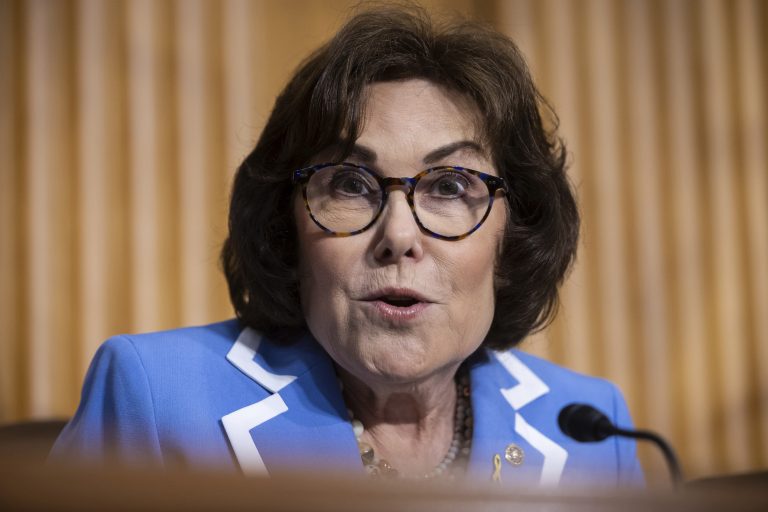Senate Majority Leader John Thune is dangling another carrot for Democrats. They still aren’t ready to bite.
In his latest pressure tactic, the South Dakota Republican is teeing up yet another vote to reopen the government Friday, the 38th day of the record-setting shutdown. But this time, he is pledging to swap out the House-passed stopgap bill for a new funding patch, likely into January, along with full-year funding for veterans programs, food aid and more.
“It’s what they asked for,” Thune said Thursday night.
But Democrats, stiffened by their party’s big election wins Tuesday that have papered over rising internal divisions, are expected to block a procedural vote yet again, according to two people granted anonymity to describe caucus dynamics, as well as interviews with several potential Democratic swing votes.
They are intent on forcing President Donald Trump and fellow Republicans to cough up a better deal and finally engage on their central demand — an extension of expiring health insurance subsidies that aren’t definitively addressed in the latest GOP offer.
“Leader Thune isn’t doing himself any favors by not coming to the table,” said Sen. Jacky Rosen (D-Nev.), who has been viewed as a possible swing vote but said she would vote no Friday.
Several other Democrats professed unity coming out of a long lunch meeting Thursday — one of several they’ve held this week as they’ve wrangled over an endgame to the long shutdown.
Sen. Dick Durbin (D-Ill.), the No. 2 party leader, said Thursday that Democrats “are as unified as we have ever been,” while adding that “people understand the gravity of the shutdown.”
But those proclamations belied the behind-the-scenes tensions between a group of Democratic senators who believe the time has come to reopen the government and the caucus’ progressive bloc, which is aghast at the idea of surrendering without a health care deal, especially after Tuesday’s elections.
“They’ve got to stand up, and they’ve got to fight,” Sen. Bernie Sanders (I-Vt.) said of his fellow caucus members in a brief interview Thursday night. “They have the American people at their back. And Republicans are going to have to come to the table and recognize they just cannot double premiums for millions of Americans in this country.”
Other corners of the caucus, however, believe Sanders and his allies — who have not participated in the bipartisan talks — are simply wanting to brawl with Republicans without having a realistic plan to bring the longest shutdown on record to an end.
The progressives “have yet to articulate any sense whatsoever of how they think this ends or any proposal to get Republicans to the table other than waiting longer and longer,” said a Senate Democratic aide who was granted anonymity to comment candidly about caucus dynamics. “And in the meantime it’s the families who can afford it the least that are increasingly getting walloped by the shutdown.”
“We are not going to get a better offer,” another Democratic aide involved in the bipartisan talks added.
That’s the case the Senate Democrats who have been negotiating have been trying to make privately to their colleagues, and they believed they were gaining traction earlier this week. But the sweeping election gains Tuesday fired up other Democrats and left many wondering if Republicans would offer new concessions.
Progress has been made in recent days toward finalizing a three-bill package that would fund some federal agencies through September, one that would be attached to a stopgap bill to reopen the rest of the government for just a few months. Republicans are also discussing whether a final deal can involve rehiring thousands of federal workers who were laid off during the shutdown — a new element first reported by POLITICO Thursday.
But according to a person granted anonymity to describe the sensitive talks, there has been no new GOP offer on health care. Republicans are willing to commit to a future vote to extend the Affordable Care Act subsidies by an agreed-upon date but they have not moved off their position that the government must reopen first. Nor has there been any progress in getting Trump or Speaker Mike Johnson to guarantee a path forward for any Senate-forged compromise.
“I’ve made this very clear to them that I can’t guarantee them an outcome — I can guarantee them a process,” Thune said Thursday. “We’ve had that conversation multiple times already.”
As senators left the Capitol around dinnertime Thursday, they still didn’t know what exactly Thune would be asking them to vote on Friday. To allow more time for talks to progress, the Senate won’t come into session until noon Friday, and a time hasn’t yet been scheduled for the promised vote.
If it fails as currently expected, it’s unclear what Thune might do next. Sen. John Barrasso of Wyoming, the No. 2 GOP leader, said Thursday the Senate would stay in session over the weekend, but senators could head home — potentially for a scheduled weeklong Veterans Day recess — if there’s no hope of a breakthrough.
The uncertainty had weary senators questioning whether the end is truly in sight.
“We’ve been talking for days, but there’s no product,” said Delaware Sen. Chris Coons, who is among the Democrats considered most likely to support a bipartisan compromise. “I’m hopeful we can find a way through this over the weekend.”
Sen. Mike Rounds (R-S.D.), who has been closely engaged in the bipartisan talks, said Thursday night there is “no organized effort at this point that is bearing fruit.”
“There are attempts to find a way to bring people forward, but I’m discouraged,” he added. “I’m hoping that overnight things might change a little bit, but I’m not optimistic.”
Jennifer Scholtes, Mia McCarthy, Katherine Tully-McManus, Meredith Lee Hill and Nicholas Wu contributed to this report.

